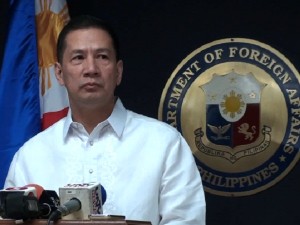Cambodian envoy has some explaining to do
The Department of Foreign Affairs (DFA) on Tuesday summoned the Cambodian ambassador to the Philippines to explain his published letter accusing the Philippines and Vietnam of “dirty politics” when they pressed the Association of Southeast Asian Nations (Asean) to adopt an “inflexible and non-negotiable” stand on the territorial disputes with China.
DFA spokesperson Raul Hernandez said the DFA summoned Cambodian Ambassador Hos Sereythonh to explain his letter blaming the Philippines and Vietnam for Asean’s failure to adopt a joint communique at last month’s ministerial meeting in Phnom Penh.
“We summoned the Cambodian ambassador yesterday and today but he is indisposed. We got word he is not feeling well. This morning he sent his deputy, Second Secretary Tan Chandaravuth. We will continue to summon him until he is able to come,” Hernandez said yesterday.
DFA handed Chandaravuth a note verbale when he appeared Tuesday.
The move appeared to further deepen divisions with the 10-nation regional bloc.
Sereythonh’s letter, published in a national daily on Monday, was in response to a published article by a Philippine diplomat that blamed Cambodia for Asean’s failure to issue a joint communique.
Replying to the charges, Sereythonh had said the Philippines should not blame Cambodia for what happened. He countered that the Philippines and Vietnam “wanted to sabotage and hijack” the meeting by insisting the regional body “include their national bilateral disputes with China” in the joint communique.
In summoning the Cambodian diplomat, Hernandez said “We want him to explain what he meant when he stated that the “inflexible and non-negotiable position of two countries of Asean is dirty politics.”
Sereythonh’s letter was in response to Foreign Undersecretary for Policy Erlinda Basilio’s article “Why there was no Asean joint communique” during the 45th Asean Ministerial Meeting (AMM), a first in Asean history.
In her article, published in the Philippine Daily Inquirer, Basilio said Asean had agreed on key points of a proposed Code of Conduct on the West Philippine Sea (South China Sea) and the islands within, where several Asean nations have disputes with China.
Basilio said the joint communique failed due to the Asean chair’s “firm position” to leave the West Philippine Sea issue out of discussions. With reports from AP and AFP
For comprehensive coverage, in-depth analysis, visit our special page for West Philippine Sea updates. Stay informed with articles, videos, and expert opinions.
